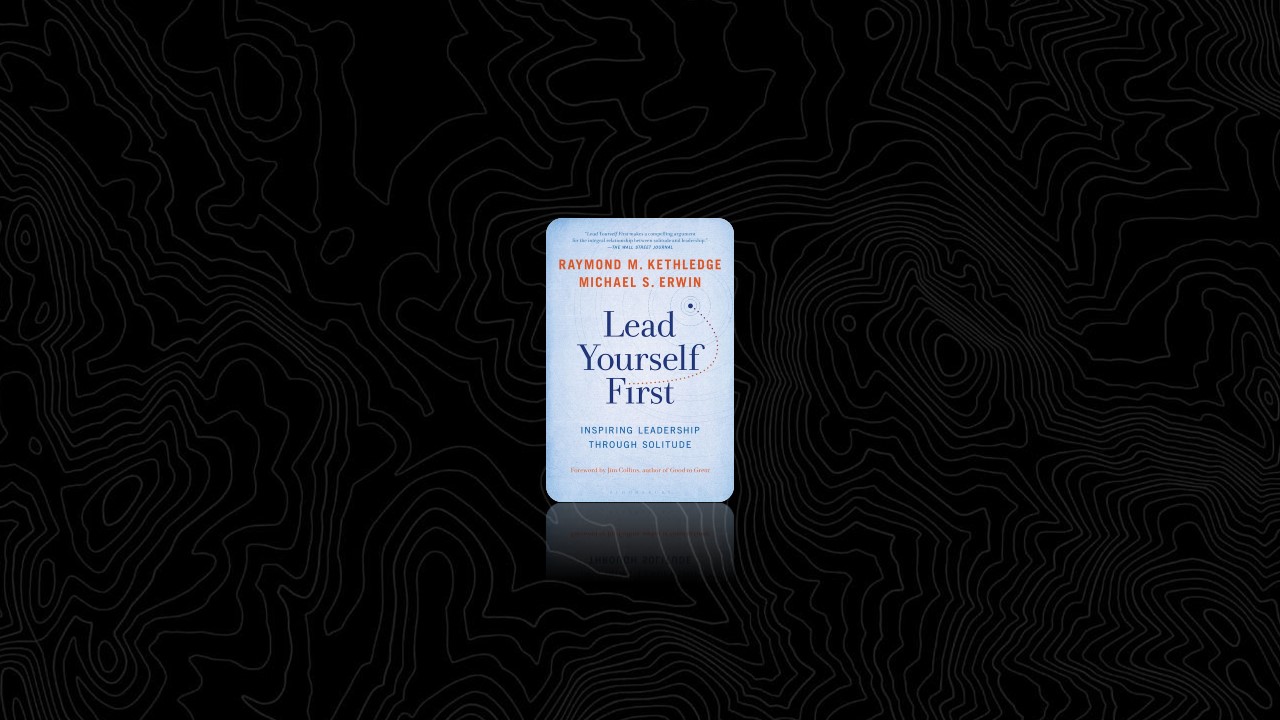To lead others, you must first lead yourself. That, ultimately, is the theme of this book.
Leadership, as Dwight Eisenhower defined it, is “the art of getting someone else to do something that you want done because he wants to do it.” That does not mean that leadership amounts to using people; like anyone else, a leader must recognize that each person is an end in himself. It means, instead, to make others embrace your goals as their own. But to do that you must first determine your goals. And you must do that with enough clarity and conviction to hold fast to your goals—even when, inevitably, there are great pressures to yield from them. To develop that clarity and conviction of purpose, and the moral courage to sustain it through adversity, requires something that one might not associate with leadership. That something is solitude.
Solitude in this sense is not merely physical separation from others or togetherness with nature, although for some people it might involve those things. Solitude, as the term is used here, can be found as readily while sitting alone in a restaurant as it can on Mount Rainier. It is not an objective concept but a subjective one. It is, simply, a subjective state of mind, in which the mind, isolated from input from other minds, works through a problem on its own. That isolation can be sustained, as it was for Thoreau or is for a long-distance runner. Or it can be intermittent, as it might be for a person who reads a book—which of course is a collection of someone else’s thoughts—and then pauses occasionally to think through a passage’s meaning. But what comes in between those moments of isolation must focus the mind, rather than distract it.
Clarity
Clarity is often a difficult thing for a leader to obtain. Concerns of the present tend to loom larger than potentially greater concerns that lie farther away. Some decisions by their nature present great complexity, whose many variables must align a certain way for the leader to succeed. Compounding the difficulty, now more than ever, is what ergonomists call information overload, where a leader is overrun with inputs—via e-mails, meetings, and phone calls—that only distract and clutter his thinking. Alternatively, the leader’s information might be only fragmentary, which might cause her to fill in the gaps with assumptions—sometimes without recognizing them as such. And the merits of a leader’s most important decisions, by their nature, typically are not clear-cut. Instead those decisions involve “a process of assigning weights to competing interests, and then determining, based upon some criterion, which one predominates. The result is one of judgment, of shades of gray; like saying that Beethoven is a better composer than Brahms.”
Solitude offers ways for leaders to obtain greater clarity. A leader who thinks through a complex problem by hard analytical work—as Eisenhower did before D-day—can identify the conditions necessary to solve it. A leader who silences the din not only around her mind, but inside it, can then hear the delicate voice of intuition, which may have already made connections that her conscious mind has not. And a leader who is aware of his weaknesses can guard against them.
Other benefits are more spiritual, but no less important because of it. The best work is inspired work. A reflective leader will ask not only what decision she should make, but whether and how her actions advance some larger purpose. A party of mountain climbers does not seek merely to climb the mountain. A teacher can teach his students more than just the subject of his class. A parent of a child with special needs might find profound meaning in the struggles of her child and herself alike. The most inspiring leaders are ones who find a clarity of meaning that transcends the tasks at hand. And that meaning emerges through reflection.
Creativity
If clarity serves to identify which of the available options will be most effective for a leader, creativity serves to develop a possibility the leader was not aware of before. Sometimes, as Mihaly Csikszentmihalyi describes in his seminal book Creativity, a creative work or idea is one based on rejection of established norms in the relevant field. Beethoven’s Eroica symphony—which exploded the rigid symphonic form used until then—is an example. So was Ulysses S. Grant’s decision to cut his own supply lines at Vicksburg. On other occasions a work is creative not because it rejects what came before, but simply because its content is new. Marie Curie’s discovery of radiation is an example. And on still other occasions an idea is creative because it is based on horizontal connections between things that at first seem unrelated.
As with clarity, there is an intuitive path to creativity, on which much of the work is already done for the leader, if only he will pause to listen. Joey Reiman makes a point of spending time on that path, finding connections between his clients’ products and ways to assuage society’s ills. “The best creative idea I’ve ever had was to create a company whose foundation is thoughtfulness,” says Reiman, founder and CEO of BrightHouse, a consulting firm in Atlanta. Joey himself combines intuitive creativity with a joyful, almost effervescent embrace of spiritual values. In 1975, when Joey was twenty-two, he was a passenger during a near-fatal car crash in Rome. “My right arm and hand were paralyzed,” he says. “The doctor told me I’d never use them again. I was in the hospital for three months. At the time, that felt like loneliness rather than solitude.” From his hospital bed, Joey recalls, “I made a pact with God: if I got my hand back, I would do something purposeful in my life.”
Joey did recover full use of his hand, but the pact drifted away from his mind. He entered the advertising business and eventually founded his own firm, which was highly successful. Yet he was unhappy with his work. “I was troubled by the metrics of the advertising business,” he says. “We were convincing people to buy things they don’t need, and creating needs they don’t want.” In 1994, his firm became part of a larger advertising firm. Joey attended a firm-wide meeting in London the following year. “One of the firm’s executives gave a speech about how to ‘keep your clients fresh.’ I realized the work I was doing then, the money, the prestige, it was all meaningless. That was a spear-in-the-chest moment for me.”
Emotional Balance
“An effective leader is the person who can maintain their balance and reflect, when a lot of people around them are reacting,” says James Mattis, a retired four-star Marine Corps General. He sees solitude as threatened today. “If I was to sum up the single biggest problem of senior leadership in the information age, it’s a lack of reflection,” he says.
The problem is one that General Mattis himself faced. Appointed in 2011 to succeed General David H. Petraeus as commander of United States Central Command, General Mattis oversaw American military operations in a region encompassing all of the Middle East—including Afghanistan, Iraq, Pakistan, and Iran. “With two wars on,” he said then, “I get my solitude in smaller batches now.” But still he made it a priority. Known as “the Warrior Monk,” General Mattis brought his thousand-book library with him wherever he was stationed, leaving most of his personal effects behind. For him the books are portals to reflective solitude, their wisdom about the human condition oftentimes the starting place for sorting out the answer to a leadership problem. “The nature of man has not changed, unfortunately,” he says. “And it’s not going to change anytime soon.
“One source of a leader’s strength comes from having some degree of reflective ability,” General Mattis says. He cites Kipling’s poem “If,” which begins:
If you can keep your head when all about you
Are losing theirs and blaming it on you …
“Solitude allows you to reflect while others are reacting,” he says. The leader who neglects to step out of the sweep of events, to contemplate from whence they came and where they might go, finds himself merely “blown from one thing to another.” But the leader who steps outside events is a leader who can change them. “If you use solitude to draw on your reading and your past experience, to create some distance from what is happening around you immediately, then it’s well used,” he says. “We need solitude to refocus on prospective decision-making, rather than just reacting to problems as they arise. You have some external stimulus, then you go back to your experience, your education, and you see what needs to be done.”
Moral Courage
Some leadership decisions bring consequences that are more than professional. Frequently those consequences take the form of moral criticism, where opponents criticize not only the decision itself, but the person who would dare make it. During the 1930s, for example, Churchill was derided as a warmonger because he advocated increased military spending to counter the Nazi threat. Dissenters from other forms of conventional wisdom—which today often take the form of absolutes, not least on college campuses—can expect similar treatment.
And a dissenter from the orthodoxy of one’s own tribe—be it a political party or any group that finds itself in competition with other groups—faces charges of betrayal. Even small decisions can bring moral criticism: the leader who closes her door to think is aloof; so is the leader who skips boondoggle conventions in favor of getting actual work done; so is the leader who spends time with family rather than at after-work gatherings for drinks; and the leader who answers some e-mails slowly, and others not at all, is derelict.
All of these decisions involve nonconformity with the assumptions, and sometimes the cherished premises, of persons who do conform. And conformists often have a large investment, materially or psychologically, in those premises. Hence the nonconformist can expect some measure of invective in response.
Other decisions by their nature affect the leader personally. Sometimes the consequences are material, as with a decision to leave a lucrative job for a more fulfilling but less lucrative one. Other consequences weigh upon one’s conscience, as with a decision that imposes hardship on some people in order to alleviate it for others. Still other times a leader faces material and psychological consequences alike, as an entrepreneur does when she leaves the security of an established organization to take the risk of starting her own. And beyond those consequences the leader can again expect moral criticism—that she is selfish, irresponsible, or callous.
The very point of these criticisms is to enforce conformity, and thus to prevent the leader from making these decisions in the first place. Moral courage is what enables a leader to make them nonetheless. It requires not only clarity, but conviction. And to have conviction, and thus moral courage, the leader must get her soul involved.


